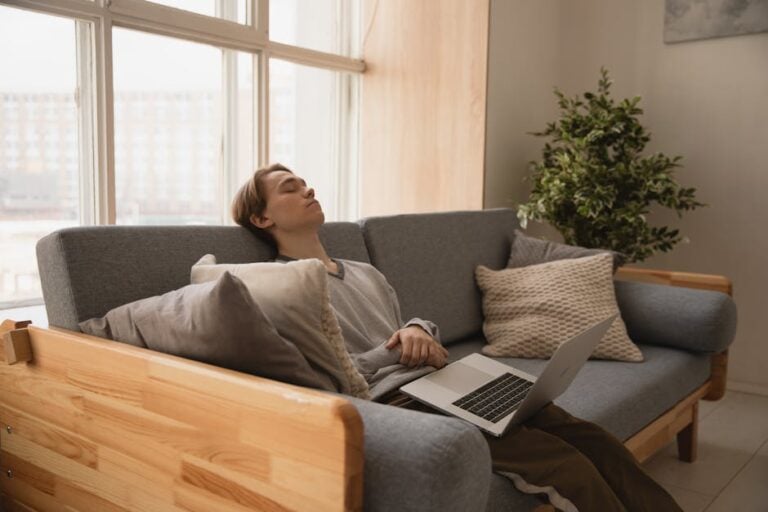Health Implications of Sleeping in a Recliner Every Night
Is it safe to sleep in a recliner every night? The short answer is yes, but there are essential factors to consider before making this a nightly habit.
Specific Health Benefits of Sleeping in a Recliner
For many, particularly those grappling with specific health issues, sleeping in a recliner can lead to a more restful night. Dr. Jacqueline Geer of Yale University notes, Recliners can keep airways open, providing relief for those with breathing difficulties. Many report improved comfort, especially if they suffer from conditions like sleep apnea, gastroesophageal reflux disease (GERD), or chronic back pain.
Potential Risks of Sleeping in a Recliner
While reclining offers several immediate benefits, prolonged use can introduce various health risks. Issues like breathing problems, joint stiffness, shallow sleep, and potential balance difficulties are at the forefront of expert concerns. Here’s a breakdown of these risks:
Breathing Problems
One troubling aspect of sleeping in a recliner is the potential for respiratory issues. According to Dr. Geer, sitting upright can sometimes restrict airflow. A hunched upper back can lead to blood congestion in the lungs, particularly harmful for those with pre-existing lung issues. If you suffer from conditions like sleep apnea, consulting a healthcare provider is crucial before making a recliner your go-to sleeping option.
Joint Stiffness
If you’ve ever awoken feeling stiff after prolonged sitting, you’re not alone. Sleeping in a recliner can lead to tightness in the hips, knees, and calves. Maintaining a bent position for extended periods places undue pressure on joints, potentially affecting your overall posture and even impairing your mobility over time.
Shallow Sleep
Achieving a full sleep cycle is critical for recovering energy, and cramped space in a recliner can hinder your ability to reach deeper stages of sleep. Dr. Eric Hsiao, a sleep medicine expert, explains that disrupted REM sleep can lead to lingering grogginess and poor sleep quality.
Possible Loss of Balance
While napping in a recliner is generally safe, long-term sleeping can lead to tightness in the muscles around your joints, which may impact your balance and mobility. Concerns arise that this outcome can increase your risk of falls and other injuries over time.
Benefits of Sleeping in a Recliner
Despite the outlined risks, sleeping in a recliner offers several distinct advantages for certain health conditions:
Improved Circulation
One of the most significant benefits of sleeping with your legs elevated in a recliner is enhanced circulation. Elevating your legs allows gravity to assist blood flow back to your heart, reducing swelling and lowering the risk of developing conditions like varicose veins or deep vein thrombosis.
Back Pain Relief
For individuals with chronic back pain, adopting a reclining position can alleviate pressure on the spine, making it easier to relax surrounding muscles. Adding lumbar support, such as a pillow, can further enhance comfort, helping you wake with less pain.
Acid Reflux Relief
Individuals who suffer from GERD often experience discomfort when lying flat. Elevating the head in a recliner can prevent acids from ascending the esophagus, thereby reducing uncomfortable symptoms like heartburn.
Sleep Apnea Management
For those living with sleep apnea, sleep disruption due to blocked airways is a primary concern. A reclined position can maintain an open airway, significantly reducing the frequency of apneic events and improving sleep quality.
Is it Okay to Sleep in a Recliner Every Night?
Expert recommendations generally suggest it’s acceptable to sleep in a recliner every night for some individuals, particularly if they have specific health conditions. Dr. Nancy Kirsch from Rutgers advises caution, emphasizing the importance of proper lumbar support. If your recliner lacks this support, consider using a lumbar roll to maintain spinal alignment.
However, for others—especially those with respiratory or cardiovascular concerns—consulting a healthcare provider is vital before making a recliner your primary sleeping arrangement.
Health Risks: A Closer Look
Long-term sleeping in a recliner carries potential risks, such as:
– Blood Clots: Prolonged positioning can increase the likelihood of deep vein thrombosis.
– Poor Circulation: Inconsistent weight distribution may obstruct blood flow, particularly in the legs.
– Respiratory Issues: If the recliner’s angle causes your upper back to hunch, it can lead to lung congestion.
Comfort Tips for Sleeping in a Recliner
If you opt to sleep in a recliner, incorporating the following tips can enhance comfort and safety:
Supportive Pillows
Utilize extra pillows for neck and lumbar support. A neck pillow maintains alignment, while a lumbar roll can ensure your back stays in a natural curve.
Optimal Spine Alignment
Adjust the height of the leg rest so your knees are slightly lower than your hips, promoting better circulation and reducing lower back pressure.
Frequent Re-Adjustments
Changing positions regularly can prevent stiffness and improve overall comfort. Consider setting reminders to stand and stretch every couple of hours.
Conclusion
At Yawnder, we understand the profound impact sleep quality has on your health. While sleeping in a recliner every night presents some advantages, it also involves notable risks. Expert opinions lean towards the use of a proper mattress for nightly rest to ensure optimal spinal alignment and deeper restorative sleep cycles.
If health issues like GERD or sleep apnea prompt you to consider a recliner, it’s advisable to seek tailored medical advice. By utilizing supportive pillows and being mindful of your positioning, you can enhance your comfort while mitigating some risks.
Investing in an adjustable bed might be a wise alternative, offering the benefits of reclining positions with better overall support. At Yawnder, we offer personalized sleep studies aimed at identifying the best solutions tailored to your unique needs. Prioritize your long-term health by choosing a sleep system that enables you to wake refreshed and ready to conquer the day.

